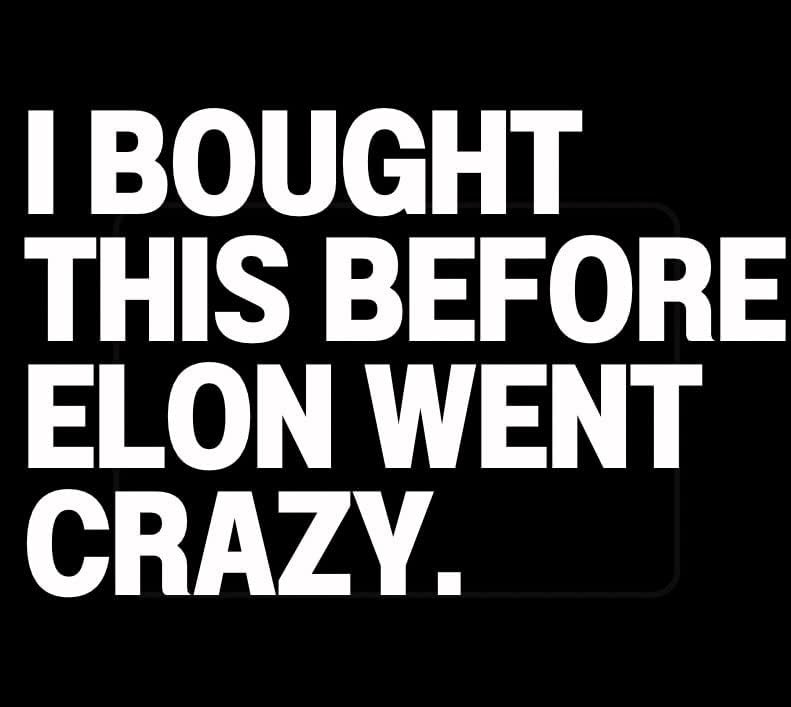A brief rabbit hole occasioned by (gestures with hands wildly).
Welcome to Being Non-Omniscient
In teaching a course on the doctrine of God this semester, one very obvious thing has become increasingly clear to me:
Well-Intended Past Decisions Have Future Consequences That You Can’t See.
As an aside, once you dig into the writings of the canon of pre-modern Christianity, there are few tropes like “They were all just Platonists!” or “They were playing weird with Scripture!” that stick. I will take their weird commentary on Scripture nine times out of nine over the dry-as-dust analysis that begins and ends with parsing the aorist tense. Give me some verve, some panache! Put some spin on Judges to make it sing!
But the one thing that can be said, without reserve, is that they did not always—like all of us—know all of what they were doing.
As we read their writings hundreds of years afterwards, lines of argument which are meant in one direction, hit differently later.
Case in point:
In John Calvin’s reflections on the doctrine of the Trinity1, for example, he uses a line of defense that to name Jesus’ divinity which is observable and practical: See how Jesus heals! Look how Jesus feeds! Only God can do that! There’s very minor precedent for this approach to defending a doctrine of the Trinity, as for the most part, this approach to defending the Trinity isn’t deployed as much as metaphysical arguments on the nature of divinity, the distinctions between created and uncreated essences, and so forth.
Calvin takes this approach, rather than defending a doctrine of God on metaphysical grounds, because his audience doesn’t largely understand Aristotelian metaphysics. They’re folks with a working knowledge of the Scriptures, but don’t press it too far: they want to know how we can understand the invisible God by the Jesus of flesh and blood. Calvin, being a pastor, argues in a way that lay folks can hear.
In time, however, this appeal to God’s effects in history will take on a life of their own, with theology now dominated by its empirical effects. Whenever you hear a sociologist talking about the practical effects (or lack thereof) of religion, you’re living in the after-effects of justifying a doctrine on the basis of its visibility in history. Whenever an apologist tries to defend God on the basis of a miraculous healing, this is the afterlife of a posture, visible in Calvin, which takes on a life of its own. It leads straight to Ockham’s razor.
I mention this somewhat arcane example from John Calvin to make this simple point: sometimes, an action taken in good faith becomes an albatross in the future. This is manifestly different than a malicious action in the present which becomes worse in time, for two reasons.
First, as Augustine frequently noted, our intentions are pointed toward objects in the world, and in doing so, toward God: we learn to love, for example, by loving particular people, not by loving abstractly2. Our intentions, because they are attached to moving objects in time, though, can’t control the effects our our intentions.
But second, and as important, even when we can control our intentions and the immediate effects, we have no idea what time might do with our effects. As with Calvin, a well-intended effect in the 1560s will dovetail with pragmatic reductions of religion by the 20th century.
The Curious Case of Tesla Regret
I’m on record here as thinking that there are good reasons to not like Tesla, long before Elon Musk’s malevolent political presence did away with a Social Security office and the TSA office in Abilene, and before he was unlawfully allowed access to sensitive data from everyone in the country.
Oh No! I Bought A Cybertruck!
What to do when you’ve bought a Cybertruck. Part of an ongoing and occasional advice series examining the stakes of only somewhat serious questions.
There are plenty of reasons to think that Teslas aren’t worth the investment, even if the intent of wanting to drive something electric is.
But I think it goes without saying that a good number of Tesla owners are rethinking their past choices. Tesla resale values have fallen by half due to so many owners wanting to unload their vehicle because of Musk’s government-by-meme approach. Other Tesla owners have taken a more creative approach:
But at the end of the day, whether you try to hide it as an Audi or bumper sticker it up, you’ve still bought a car which is irevocably identified with a very public-facing fraud.
The case here, I think, is similar to Calvin’s, though the reasons that anyone buys a car are mixed. To return to Augustine’s approach to intention, none of us know all of why we intend all that we intend. Our intentions, in the best of times, are mixed. We make a decision because it’s true, because it’s expedient, because it gives us glory, because we are short on time—sometimes all at once. We love our children because they’re ours, because they’re God’s, because they’re God’s good creation, because they make us happy—altruism, purity, and selfishness all knotted together. Drawing on a certain way of explaining the Trinity is less fraught in this way, determined first by wanting to pass on the faith and very secondarily with fame and fortune.
But let’s assume something of the best, that a person bought a Tesla for ecological reasons, even if the ecological evaluations of Teslas are still pretty mixed. The problem identified above remains: they’re driving something associated with Elon. It doesn’t necessarily mean that every owner needs to ditch their cars out of shame: taking a 25,000$ loss isn’t a great thing to do unless something like your soul is on the line, and I don’t think owning a car that embarrasses you is on that level.
Making a moral change because you’re embarrassed of the associations isn’t the same as making a change because you’re ashamed of the choice. You can’t help that Elon is spearheading cuts that are ruining hundreds of thousands of lives. Selling your Tesla of of embarrassment isn’t solidarity, nor is it reversing the damage Elon is doing. Firebombing Teslas only gives 45 an excuse to expand his wicked definition of domestic terrorism, so don’t play into that.
Your past self couldn’t have known the future inheritance of your choice, even if there are some inheritances worth disavowing. There’s a Scriptural case for burning the Asherah poles, for drinking the broken down idol made of precious gold you brought out of Egypt. But in these cases, there’s a connection between the thing disavowed and the damage that thing causes: burning down an altar in Judges prevents it from doing spiritual damage to others. Symbolic sales of Teslas, or correspondingly, burning Teslas in protest, do nothing here: they neither damn the past, nor do they redeem the future of those choices: my government friends still have ruined lives.
There are some choices we get to live with, as mild to moderate humiliations, and in Lent, humility is one of the pivotal virtues to be cultivated. My 2014 self who adopted the Astros didn’t know they’d cheat in the World Series, and I still plan on going to two of their games this year. In many parts of life, bearing up under humiliation is part of what is prerequisite to any other kind of moral change: don’t collapse under it or run from it. Acknowledge the wrong, burn it if necessary, let the embarrassment do its work to change what we want and how we might commit ourselves to different goods more permanent than vanity. Don’t sell the Tesla: take the bus and demonstrate the need for the things the overlords take away.
Learning to live with marks of humiliation is a part of being a human who will age, become dependent, crap ourselves, and lose ourselves entirely. There is a way in which these choices linger, haunt us. We are deflating and frail creatures of dust, thanks be to God.
You can find this in Book 1.19 of his Christian Institutes, which I commend to you, dear reader. Even when he’s wrong, he’s wrong in interesting ways.
For a good treatment of this theme, see Nightingale, Andrea (2015). Augustine on Extending Oneself to God through Intention. Augustinian Studies 46 (2):185-209.








Hmm. I would never own a Tesla, but not because of Elon., Who cares if the owner of a company is an objectionable person? It's pretty common, actually, as we are all sinners. Should I get rid of my Ford because Henry was a rabid anti-semite and Nazi sympathizer? And everyone has known that for years, so there is no excuse or 'embarrassment' of not knowing. If you happily drive a Ford, but not a Tesla because you hate Elon, aren't you a hypocrite. Shouldn't the question be what the company is doing, not the character or behaviour of the owner? It's not as though we are choosing Elon as a friend. Is Tesla doing evil, is the question. Obviously, the liberal consensus was it was doing great good! Then they made Elon a hero of the environment. But that, too, was an error. He's just a human being with flaws. Judge the actions, not the character.